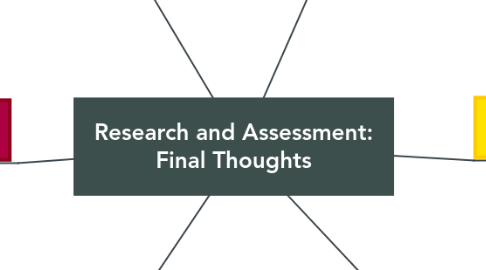Research and Assessment: Final Thoughts
by Jess Moco

1. Research and Assessment as Human Activities
1.1. Frame assessments with the 7 fundamental principles outlined in the Growing Success document. Principles 1 and 2: Assessments that are fair, transparent, and equitable for all and that support all students should not be principles, they should be requirements.
2. Messages In, Messages Out
2.1. We tend to look at assessment as the result or the end goal, but in reality, we should be more concerned with the process and the way in which students get there. From a teacher's perspective, effective feedback on a student's progress/process is much more valuable than a number grade.
3. Connecting High and Low
3.1. Employing the Growing Success document into assignment/assessment making should guide the collection of meaningful information that will help inform instructional decisions, promote student engagement, and improve student learning.
3.2. The gradual release of responsibility between teacher and student is something that a lot of educators overlook. Teaching students to be independent in their education is an invaluable skill and will assist them in their future. The gradual release of responsibility can be described with the following quote: "Tell them and they will forget. Teach them and they will remember. Involve them and they will learn."
4. 3 Big Ideas Learned
4.1. The primary purpose of assessment and evaluation is to improve student learning, NOT to box them into categories like 'successful' and 'unsuccessful.' Marks are not always reflective of a student's potential.
4.2. In triangulation of assessment, peer- and self-assessment are just as, if not more, important than the overall assessment of learning. Allowing for collaboration and reflection are key in determining success.
4.3. The ability to self-assess and accept others' assessments of you are learned skills. Without them, it is extremely difficult to change or develop a growth mindset.
5. 3 Actions I Plan on Using
5.1. Create assessment rubrics with my students as to best identify success criteria and to give them a sense of agency in their assignments and the way they are graded.
5.2. Utilize holistic type rubrics as the categories are not that specific and allow our students more room for improvement.
5.3. Utilize educational research as much as possible to stay up to date on past, current, and future educational trends to better my teaching style and pedagogy. For me, educational research will include my own students' experiences, scholarly articles/journals, and professional development workshops.
6. 1 Action I Plan on Stopping
6.1. Stop being afraid to use educational research in my teaching practice because it can be 'time consuming', 'boring', 'irrelevant to my practice', etc. Educational research is beneficial for both teachers and students - we need to be promoting our ability to be able to research and use past knowledge/experiences to better our own practices.


